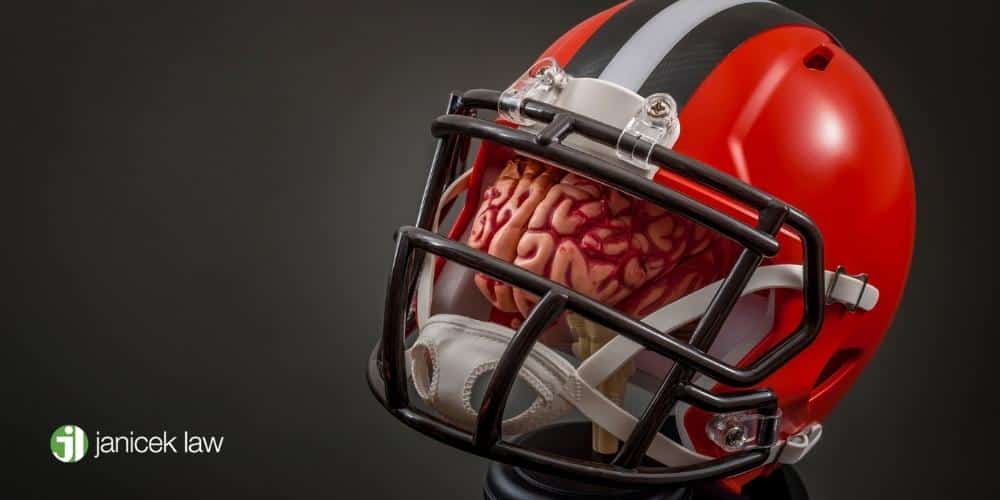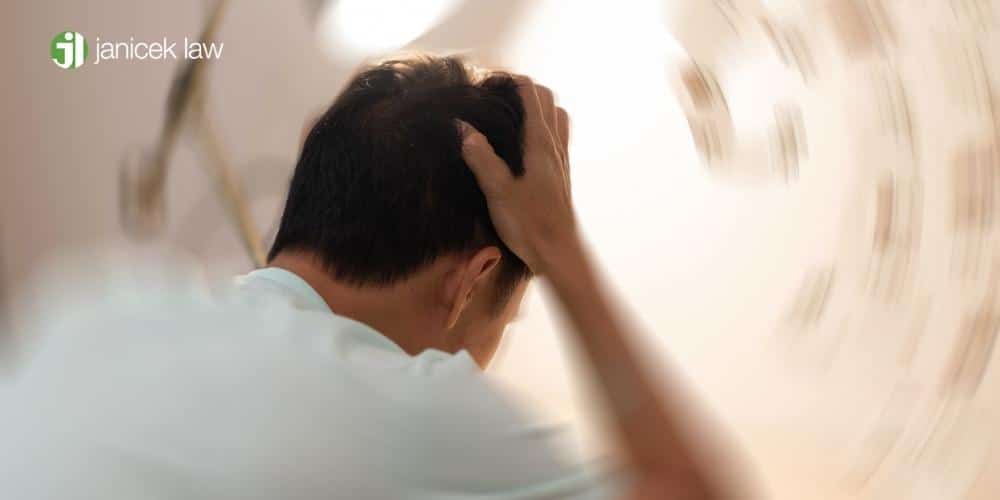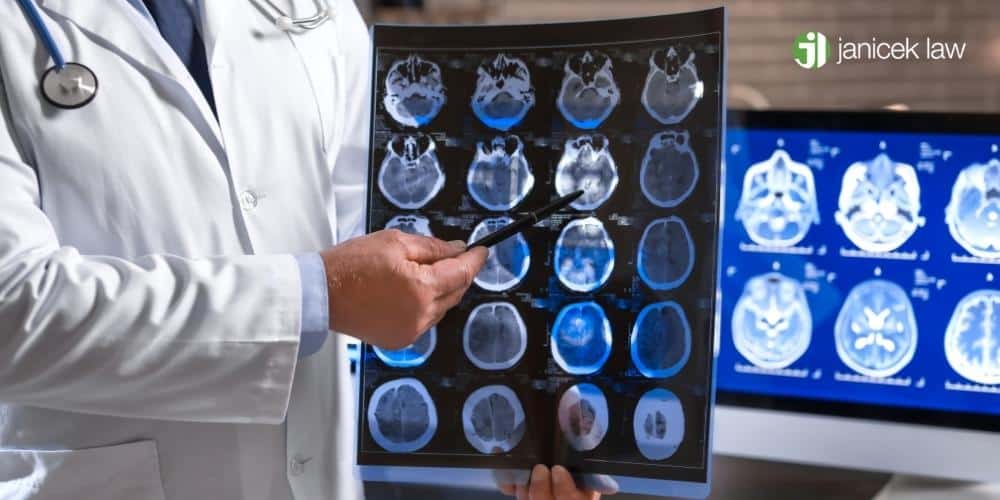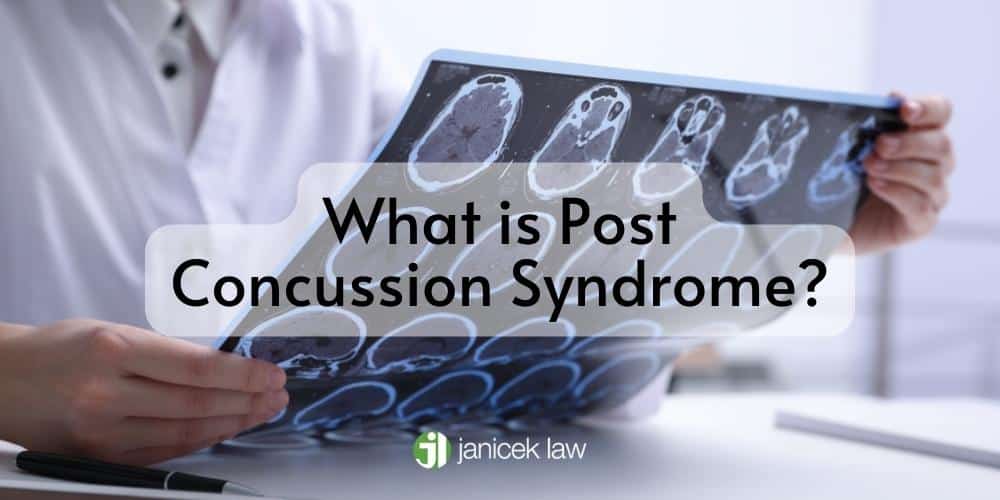A concussion is a minor traumatic brain injury that can lead to a wide variety of debilitating symptoms and even temporary brain dysfunction. These reported symptoms can cause patients to take weeks off work and spend hours in their doctor’s office. As a result, patients may endure financial distress due to lost wages and medical bills. Most patients recover after their initial injury. Meanwhile, some patients who have mild traumatic brain injuries suffer persistent post concussion syndrome symptoms for months or even years. Below, the San Antonio personal injury lawyers at Janicek Law explain risk factors, treatments, prognosis, and whether or not you can sue for post concussion syndrome.
Janicek Law is a top-notch personal injury law firm in San Antonio, TX. For decades we have helped countless Texans recover financial compensation for injuries caused by car accidents, nursing home falls, medical malpractice, premises liability violations, and so much more. We can do the same for you. Call 210-366-4949 to schedule a free consultation with us today.
What is a Concussion?
A concussion is basically a mild traumatic brain injury (TBI) that occurs from a violent blow to the head. Violent jolting will cause the brain to shake inside the skull. This causes temporary bruising of nerves and other brain tissues. Victims may or may not lose consciousness from this mild head injury. The mild TBI may cause a variety of physical symptoms, cognitive symptoms, and psychological symptoms for a few weeks. Some victims may even develop PCS, which is postconcussive syndrome.
Common Causes of Concussions
Anyone of any age can suffer a minor head injury like this. But the most common causes of this type of head trauma include:
- Sports accidents
- Motor vehicle accidents such as car accidents, truck accidents, motorcycle accidents, bicycle accidents, and pedestrian accidents
- Slip and fall accidents
- Nursing home fall accidents
- Violent physical assaults
- Accidentally bumping the head on a hard surface
- Explosions (most common cause among active duty military personnel)

What is Post Concussive Syndrome (PCS)?
Sometimes, if the brain trauma is severe enough, people can experience persistent symptoms for much longer than a few weeks. This is called post concussion syndrome.
How Common is Post Concussion Syndrome?
90% of reported symptoms for mild head injuries like this will fade over a few weeks according to a study. Meanwhile, 15% of concussion victims will experience persistent post concussive symptoms that require extensive medical care.
Post Concussion Syndrome (PCS) Symptoms
Common symptoms associated with post concussion syndrome are nearly identical to regular concussion symptoms. Patients may experience the physical, emotional, and cognitive symptoms listed below.
Physical Symptoms
Physical symptoms of post concussion syndrome include:
- Headaches
- Dizziness
- Sleep problems such as trouble sleeping or sleeping too much
- Sensitivity to light and sound
- Chronic fatigue
- Ringing in the ears
- Blurry vision
- Decreased taste or smell
- Mild GI symptoms like nausea and/or loss of appetite
Psychological Symptoms
Psychological or emotional symptoms of post concussion syndrome may include:
- Mental disorders such as anxiety, panic, and post traumatic stress disorder (mostly related to the original accident that caused the mild head injury)
- Depressed mood
- General mood swings and mood disorders
- Irritability
- Restlessness
- Lack of interest in almost everything
- Drastic change in personality
Cognitive Symptoms
Post concussion syndrome may also cause cognitive impairment. PCS patients may experience the following cognitive deficits:
- Short or long term memory loss
- Difficulty concentrating
- Poor attention span
- Brain fog
How Postconcussion Syndrome is Diagnosed
There is not a single test or scan that can diagnose PCS. Health care providers generally diagnose post concussion syndrome based on the patient’s head trauma history and persistent post concussive symptoms.
Basically, if a mild traumatic brain injury patient is experiencing prolonged symptoms for more than 3 months, they likely have post concussion syndrome.
Doctors may also run a few tests such as magnetic resonance imaging (MRI) or computerized tomography (CT) scan to determine a diagnosis. However, these scans alone should not be the basis of a PCS diagnosis. Post concussion syndrome symptoms and their duration are the main diagnostic criteria for this syndrome.
Risk Factors for Post Concussion Syndrome
The biggest risk factor for developing PCS is experiencing a prior head injury or concussion. Other risk factors are listed below.
- Psychological Factors: Many traumatic brain injury experts believe that people who have pre-existing mental disorders such as post traumatic stress disorder, anxiety, depression, etc. are more likely to develop post concussion syndrome symptoms. That’s because many of these persistent symptoms are psychological. Even a mild TBI can exacerbate pre existing neuropsychiatric symptoms.
- Age: People over the age of 40 years old are more likely to experience post concussion syndrome symptoms. More specifically, elderly people who experience frequent falls are the most at-risk age group for not only developing a mild traumatic brain injury, but PCS symptoms too.
- Being Female: Women have a higher risk of developing post concussion symptoms. But traumatic brain injury experts believe this is because women are more likely to seek medical attention compared to men.

Post Concussion Syndrome Treatments
If you believe you’re suffering from post concussion symptoms, it’s crucial to seek medical care in order to receive relief. There is no designated treatment for persistent postconcussive syndrome. Instead, health care providers have to use a combination of treatments that may or may not provide relief from post concussion symptoms.
Treatment heavily depends on the persistent post concussive symptoms the patient is experiencing. Health care providers may recommend the following treatments:
- Medication: Many mild traumatic brain injury sufferers take antidepressants and anxiety medications to experience relief from the psychological symptoms associated with their brain injury. Additionally, if the patient is experiencing any kind of chronic pain, their doctor may prescribe pain medications. Sometimes, the side effects of antidepressants and pain medications can make post concussion symptoms worse, so sufferers may have to try many different types of medications before they find one that works for them.
- Psychological and Cognitive Therapy can be extremely beneficial in reducing persistent post concussive symptoms. That’s because many of the reported symptoms are cognitive and psychological. So qualified therapists can recommend exercises and coping mechanisms which may provide gradual relief from persistent post concussive symptoms.
- Chiropractic Care may reduce some of the common symptoms associated with a mild traumatic brain injury. That’s because some health care providers believe that some head trauma symptoms are caused by a misalignment in the cervical spine, specifically a misalignment of the C1 and C2 vertebrae. Allowing a chiropractor to realign these vertebrae in the neck may improve some persistent post concussive symptoms and neck pain.
Post Concussion Syndrome Prognosis
Generally, the vast majority of people with persistent post concussive symptoms have a good chance of full recovery within 6 months to a year, with the most common lingering symptom of a mild TBI being headache. Only 10 to 15% of mild traumatic brain injury sufferers experience the reported symptoms for longer than a year.
Can You Sue for Post Concussion Syndrome?
Yes, you can certainly sue for post concussion syndrome, especially if your condition was directly caused by someone else’s negligence. For example, a drunk or distracted driver hit you, and as a result, you suffered a mild traumatic brain injury. Contact our San Antonio drunk driving accident lawyer group to learn more.
If you suffered a sport-related concussion, you may not be able to sue unless the school or sport team’s negligent actions directly caused the mild TBI. For example, maybe the school or sport team provided poor headgear which played a large role in the head injury.
In order to have the strongest personal injury claim possible, you must prove the 4 D’s of negligence listed below.
- Duty of Care: Everyone owes each other a specific level of care when doing anything. For example, all drivers must make a reasonable effort to keep other drivers safe by following traffic laws.
- Duty Dereliction: The negligent party violated this duty of care through action or inaction.
- Direct Cause: The negligent party’s action or inaction directly caused the head injury.
- Damages: The mild TBI sufferer deserves compensation for the damages they suffered as a direct result of the negligent party’s action or inaction.
If you are looking to sue a negligent party for your persistent post concussive symptoms, you need strong legal representation on your side. A San Antonio personal injury lawyer at Janicek Law will carefully review the facts of your case, help you prove the four elements of negligence, gather sufficient evidence to prove that negligence occurred, and help you recover fair financial compensation.
Damages for a Traumatic Brain Injury
Sufferers of a moderate and severe TBI may be able to recover financial compensation for the damages listed below:
- Past and future medical bills
- Past and future physical therapy bills
- Lost wages
- Loss of earning capacity if the persistent post concussive symptoms prevent the person from completing their normal job duties
- Physical pain and suffering
- Emotional distress
- Counseling expenses in order to manage the psychological symptoms associated with postconcussive syndrome
- Loss of enjoyment of life

Call a San Antonio Personal Injury Lawyer at Janicek Law Today
Any type of head injury can affect brain function, quality of life, and overall health and wellness for months post injury. That’s why it’s so important to seek out your legal options following a traumatic brain injury, especially if someone’s negligence is to blame. Our team of San Antonio personal injury lawyers has what it takes to successfully litigate neck injury and head injury cases caused by car accidents, nursing home falls, premises liability violations, and so much more. Call 210-366-4949 to schedule a free consultation at Janicek Law today.

